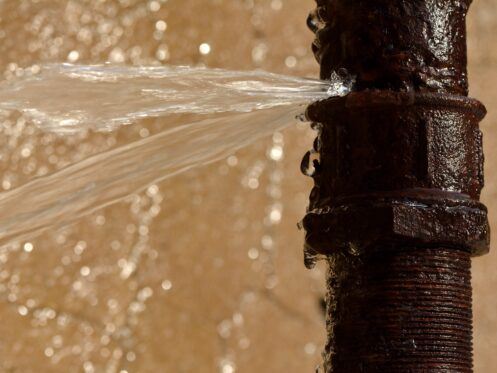Pipes are part of an extensive underground plumbing network that serves your home each day. Over the course of daily usage, however, pipes can undergo wear and tear. When enough pressure or strain makes pipes burst, the subsequent property damage and financial losses can be catastrophic. Burst pipes can cause structural damage and flooding that result in costly repairs. According to the Insurance Information Institute, water damage from burst or broken pipes is among the most common home insurance claims. But why do pipes burst in the first place? A look at the causes of burst pipes can provide insight into how to protect your home and how to handle this plumbing disaster.
Why Do Pipes Burst?
As a homeowner, the last thing you want to experience is the occurrence of water gushing from a burst pipe. Pipes can burst for reasons ranging from weather to environmental changes. Common causes include freezing, tree roots, corrosion, water pressure, or installation problems.
Freezing Temperatures
Freezing is one of the most well-known causes of burst pipes. When temperatures drop below the freezing point of 32 degrees Fahrenheit, the existing water inside of pipes slowly starts to freeze. As freezing water changes to ice, its volume expands. This expansion can become too much for the pipe to contain, and the structure can subsequently burst. In addition, frozen water at one end of a pipe can increase the pressure level of the other side of a pipe. Water sprinkler lines, pipes in cold crawl spaces or attics, or pipes that run through uninsulated external walls are most likely to freeze. Experts recommend insulation sleeves to help protect pipes during cold weather.
Tree Root Intrusion
Tree root encroachment is another cause of burst pipes. As trees grow larger, their roots extend further into the soil in search of nutrients and moisture. Water pipes are rarely strong enough to withstand the entry of invasive tree roots. Once tree roots begin to invade an underground pipe, they continue to grow and put pressure on the pipe until it bursts. This risk is especially common in compacted soils. To help prevent root intrusion, always plant trees and shrubs as far away from your pipe network as possible.
Rust and Corrosion
Constant exposure to moisture increases the risk of rust and corrosion in metal pipes. An imbalance in the water’s pH level can also speed up the process of corrosion and rusting. Corrosion degrades pipes and creates small cuts, tears, and cracks. Rust can weaken pipe walls, joints, and sealant. Signs of rust or corrosion include water discoloration or warped pipes.
Pipe Movement
Accidental movement can cause pipes to burst. This movement occurs as the result of shifting soil. Underground soil conditions can change or shift due to landscaping, construction, or cold weather. In particular, rapid fluctuations in temperature can cause pipes to expand and contract too quickly. Shaking from water pressure or seismic activity can also shift pipes around. Pipe movement can weaken joints and eventually cause pipes to rupture or burst.
Blockages or Clogs
Clogs or blockages create pressure points within pipes. If the clog remains in place, water continues to build up in piping and can create enough pressure that the structure cracks or breaks. If you suspect a clog, it is important to schedule an appointment with a plumber before the problem escalates into more extensive damage.
Hard Water
Hard water refers to water with a high concentration of mineral content. The most common minerals that cause hard water are calcium and magnesium. These minerals can accumulate in pipes and accelerate corrosion. A plumbing company can test water hardness and recommend whether your home needs a water softener system.
High Water Pressure
Water pressure is the force exerted per unit area of water. Scientists measure water in pounds per square inch (PSI). If residential water pressure begins to exceed 80 PSI, the pipes could burst or break. When the water pressure is too high, a plumber may be able to install a pressure-reducing valve to lower it to normal levels.
Accidental Damage
Accidental impact or external pressure can eventually cause pipes to burst. For example, resting heavy items on exposed utility pipes can create weak spots that break over time. Pipes can also experience unintentional impact during renovations or lawn projects.
Poor Installation
Poor installation can also lead to burst pipes. For example, an improper soldering job or loose connections can result in a weak structure that pops under the slightest pressure. This can require professional repair or replacement to safeguard pipes from faltering in the future.
Weakness and Old Age
All pipework does not last forever. If you have older iron or steel pipes, for example, your pipework may experience corrosion at higher levels than pipes made of other materials. The combination of aging and unsuitable piping material can cause pipes to burst under any application of pressure. In this instance, you may need to upgrade your pipes to PVC or a similar material.
What Are the Consequences of Burst Pipes?
There are several reasons you should avoid allowing your water pipes to burst. If left unrepaired, the gushing water from pipes can destroy your entire home. Three negative consequences of burst water pipes include mold growth, undermined structural integrity, and irreparable loss of important belongings.
Mold Growth
Mold thrives in damp, dark areas. Burst pipes can create a cesspool that encourages the spread of mold beneath your home or behind walls.
Compromised Structural Integrity
Few things weaken the structural integrity of wood like excessive exposure to moisture. As the wood of your home absorbs water, everything from doors to beams can become warped and misshapen. Attempting to replace rotting wood is far more complex than simply reaching out to a plumber to repair burst pipes in the first place.
Loss of Personal Belongings
Flooding from burst pipes can result in the irreparable loss of personal belongings. These possessions can range from electronics to essential family heirlooms. It is important to stop the flow of water as soon as you realize pipes have burst to preserve the items in your home.
How Do You Repair Burst Pipes?
Contacting a professional plumber is the most effective way to repair burst pipes. Fixing a burst pipe requires plumbing training as well as soldering skills and the right tools. Plumbers can arrive ready with camera inspection equipment, drain snakes, and sealants to efficiently fix the issue. In the most severe cases, a plumbing team can perform re-piping to replace your existing network with sturdier or more modern materials. Trained plumbers can help you implement preventative measures, such as installing pipe insulation materials to prevent your pipework from shifting or freezing.
Contact Us Today
Burst pipes are plumbing emergencies that can cause substantial damage to your home. When disaster strikes, it is best to call an expert for help. Summit Heating & A/C provides plumbing services for homes in Denver, CO and surrounding areas. We offer pipe repairs as well as new pipe installation. Our team can perform leak detection and sewer line repair and replacement. We can also tend to other plumbing needs like gas line inspections, tankless water heater installation, or traditional water heater repair. No matter the issue, we can help. Contact Summit Heating & A/C today for all plumbing needs.


